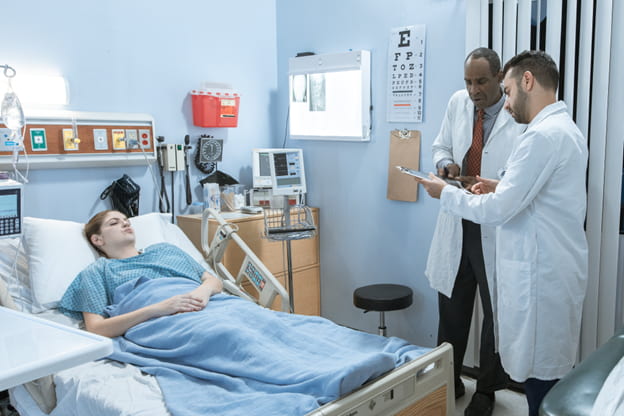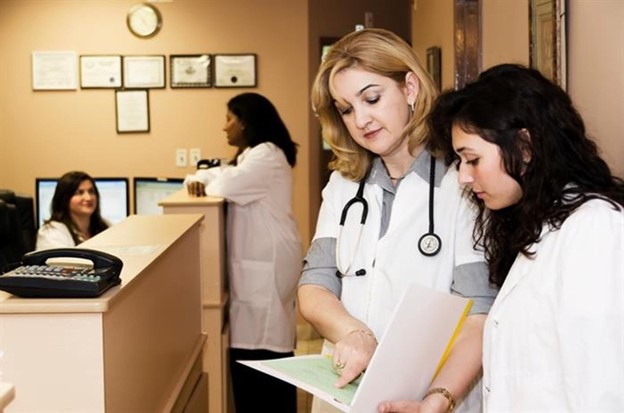From a young age, we are all taught how to work as a team. Effective teamwork benefits everyone. From promoting better problem-solving skills and providing opportunities for growth and development, to creating a shared sense of purpose leading to more innovative ideas. As our lives get busier and our individual roles become increasingly demanding, the benefits of teamwork and collaboration can often be overlooked, but the good news is – they don’t have to be!
What is collaboration in healthcare?
Taking a collaborative approach to healthcare means that healthcare professionals assume a shared responsibility for patient care. This can range from simple data-sharing at a shift swap, to meeting with other professionals to diagnose, treat, and coordinate ongoing care for a patient. Rather than each medical professional being a singular identity involved in only one facet of care, everyone involved would be interconnected; doctors, nurses, pharmacists, social workers, and more.
Collaboration can open doors to new opportunities and knowledge, whether the collaboration is a full-blown merge or a fleeting encounter. This is often referred to as collaborative advantage.
How can healthcare workers facilitate collaboration?
Individual healthcare workers can foster collaboration in several ways. In fact, you may already take on a collaborative role without realizing it. Nurses, for example, are often the primary point of contact between patients and doctors, having direct contact with patients and their families or carers.
Anyone in an advanced nursing role has experienced collaboration at some point. Obtaining and tracking accurate and relevant information for colleagues and other care providers, advocating for patients with other healthcare professionals, and assisting doctors and surgeons can all fall under the umbrella of collaboration.
Instead of focusing only on your job, think of yourself as part of a team. If your patient has other professionals involved in their care, communicate openly with them, sharing your assessments and encouraging them to share theirs- of course, while continuing to abide by any rules and regulations regarding confidentiality.
Does collaboration in healthcare really work?
The short answer: Yes!
One of the positive outcomes of the COVID-19 pandemic has been the collaborative efforts of healthcare workers throughout the U.S. and the wider world. But collaboration is not only useful in a crisis. Decades worth of experience and research shows that collaborative healthcare has all kinds of benefits.
This research dates back to 1997 when five hospitals came together in an attempt to improve the care and outcome of patients with cardiovascular disease, the leading cause of death at the time. The study grew tenfold, eventually including over 50 hospitals. These hospitals shared details of technology, treatment, complications and more. The level of transparency allowed providers to identify gaps in knowledge and learn from the practices of the other hospitals. The outcome? Improved patient care, reduced complications from the disease and readmissions, reduced costs of care, and fewer deaths!
This success story inspired dozens of other collaborative quality initiatives (CQIs), and the results have been awe-inspiring: thousands of patients have avoided complications, unnecessary treatments, and even death.
As you can see, remarkable things happen when multiple entities come together to work as a team. It results in the elusive win-win situation: patients win by avoiding unnecessary or risky treatments, they save on healthcare costs, enjoy an easier time navigating the often complicated and overwhelming healthcare system, and most of all, are more likely to experience favorable health outcomes. Healthcare professionals gain mutual respect for each other and the roles they play in patient care, they can learn and innovate through access to shared resources and inter-organizational partnerships, and derive an important sense of community and camaraderie.
A collaborative workplace is a happier workplace, according to a recent study. A collaborative work environment results in employees who are more confident, have fewer conflicts, have more innovative ideas, and have fewer instances of work-related burnout. Collaboration reduces workload, and in turn, it increases job satisfaction.
Additionally, open communication and teamwork between healthcare workers helps to strengthen workplace relationships – making teamwork and problem-solving all the more easy to achieve.

Healthcare workers all share the same goal: for the patient to receive adequate care at a reasonable cost and to leave as happy, stable, and satisfied as they can reasonably be. Working together can reduce errors, inefficiencies, and even deaths. Looking at healthcare through a lens of interprofessional collaboration rather than only looking at one aspect of a multifaceted situation means seeing the patient as a whole. Instead of considering only your area of expertise, you consider other aspects of the patient’s care and treatment, taking a more holistic approach.
Embracing your professional identity as part of a team and a system means that you see the wider picture. And seeing the entire picture allows you to make decisions that benefit the patient as a whole.
Did you find this helpful? Check out our other helpful articles on our website.
Read Also
- Transforming Patient Care with Professional Healthcare Transcription ServicesIn today’s fast-paced healthcare environment, the need for precise and timely documentation cannot be overstated. Accurate documentation is not merely an ancillary task; it is a core element of delivering high-quality patient care. The ability to maintain compliance with regulations, enhance operational efficiency, and ensure the integrity of patient records has never been more critical.… Read more: Transforming Patient Care with Professional Healthcare Transcription Services
- Essential Steps to Launch Your Own Optometry PracticeLaunching your own optometry practice can be a thrilling and fulfilling journey. However, it requires careful planning, dedication, and an understanding of what it takes to succeed. With the growth in demand for eye care, more and more individuals are seeking to start their own practices. But how do you get there? This guide walks… Read more: Essential Steps to Launch Your Own Optometry Practice
- Compounding Pharmacy: Personalized Medication SolutionsA compounding pharmacy plays a vital role in modern healthcare by providing customized medications tailored to the specific needs of individual patients. Unlike mass-produced drugs manufactured by pharmaceutical companies, compounded medications are prepared by licensed pharmacists who carefully combine, adjust, or modify ingredients to create a formulation that best suits a patient’s unique medical requirements.… Read more: Compounding Pharmacy: Personalized Medication Solutions
- The Best Business Decision a Surgeon Ever Made: Ordering a Medical Equipment AppraisalMost surgeons don’t go into medicine because they love spreadsheets, valuations, or negotiating buy-ins. They go into medicine because they want to operate, treat patients, and build something meaningful over time. For one surgeon, that mindset worked perfectly, until the day another surgeon decided to buy into his practice. That moment exposed a problem he… Read more: The Best Business Decision a Surgeon Ever Made: Ordering a Medical Equipment Appraisal
- Creative Approaches to Alleviating Healthcare Staff ShortagesHospitals and clinics are facing staff shortages, which makes it harder to take care of patients well. Finding simple and useful solutions is very important. Easy changes like flexible work hours, good training, and chances to grow can help staff stay happy. Technology, like online doctor visits and helpful tools, can make work easier. Smart… Read more: Creative Approaches to Alleviating Healthcare Staff Shortages
- Understanding the Role of Sterilizers in Healthcare FacilitiesHave you ever wondered how hospitals keep their equipment safe enough to use on dozens of patients every day? Most people never think about what happens behind the scenes, yet these hidden steps play a huge role in patient safety. Sterilizers are part of that system, working quietly to remove harmful germs before any instrument… Read more: Understanding the Role of Sterilizers in Healthcare Facilities
- Building Healthcare Access Where It’s Needed Most: A Local First ApproachHealthcare shouldn’t depend on where you live. But in the U.S., it often does. If you’re in a big city, you likely have options. If you’re in a small town or an underserved neighbourhood, it’s a different story. To fix this, more healthcare leaders are turning to a local-first approach. That means putting clinics and… Read more: Building Healthcare Access Where It’s Needed Most: A Local First Approach
- Revolutionizing Patient Engagement: Innovative Solutions for Improved Care and Treatment SuccessNavigating healthcare system can often feel overwhelming for patients. Between appointments, prescriptions, and treatment regimens, it’s easy for crucial details to get lost in the shuffle. That’s why effective patient engagement and support solutions are more important than ever. Companies like Serva Health, with their pharma hub services, are stepping up to ensure that patients… Read more: Revolutionizing Patient Engagement: Innovative Solutions for Improved Care and Treatment Success









